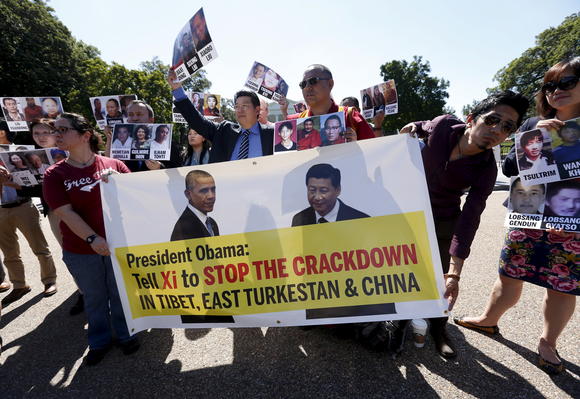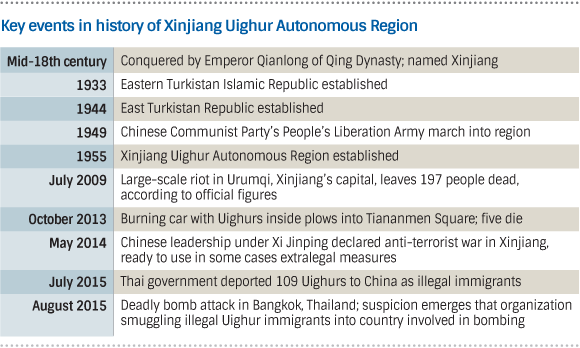
TETSUYA ABE, Nikkei staff writer
October 1, 2015 7:00 pm JST
BEIJING -- The Xinjiang Uighur Autonomous Region in western China on Thursday marked the 60th anniversary of its establishment. Beijing emphasizes the benefits that it believes the region enjoys from a "high degree of autonomy" and economic development pushed by the central government. But ethnic conflict between Uighurs and Han Chinese might flare up again any time.
"In the past 60 years, Xinjiang has surged high and swept forward in history," proclaimed Yu Zhengsheng, the fourth highest ranking figure in the ruling Chinese Communist Party in charge of religious groups and ethnic minorities. Yu was speaking at the anniversary event in Xinjiang People's Hall, in the regional capital of Urumqi. He boasted that "glorious achievements have attracted worldwide attention."
No matter how he presents the official party line, most ethnic Uighurs seem to resent Beijing's clampdown on their religion and culture and its sinicization policies. People in the region, for example, are forced to use the Chinese language. More and more Uighurs are fleeing overseas.
In Thailand, local authorities suspect a recent bombing in Bangkok has something to do with illegal Uighur migrants into the country. China's problems with Uighurs have begun to cause ripples overseas.
Information control
A 19-year-old Uighur girl came to Beijing in September to enter Minzu University of China. She is learning Chinese on the university's preparatory course.
In Kashgar -- the western part of the autonomous region -- from which she hails, Uighurs make up 90% of all residents. However, she belongs to the generation of Uighurs that have been affected most by Beijing's sinicization policies.
"I have never offered up a prayer," she said. She was born into a relatively wealthy civil-servant family. Households of civil servants are banned from conducting religious acts. She has grown up without learning anything about what has happened to Uighurs in the autonomous region and across the world, probably because of information control by the Chinese government.
Ban on beards
The Xinjiang Uighur Autonomous Region was established in 1955 when the People's Liberation Army marched into Xinjiang after winning the civil war against the Kuomintang-led government. As Yu mentioned in his speech, gross domestic product in the region is now 115.6 times that of 1955. However, a large number of Han Chinese have settled there since then, and the ethnic Uighurs as a percentage of the population have fallen below 50%. In reality, the region is effectively ruled by the Communist leadership, belying its "autonomous" title.

Beijing has stepped up its clampdown on Muslim cultural and religious customs, placing a ban on the beards of Uighur men and ethnic dresses except for government-designated ones, for example. "We had just gathered at our home and were performing a Muslim prayer when my wife and children were taken away by authorities," a male resident in the Kashgar region said. Since President Xi Jinping came to power, the nation has increasingly suppressed government discontent by force. This has led to a rapid increase in the number of Uighur refugees.
"Over there! Catch them!" shouted a plainclothes police offer. He was running through a mountainous district as he saw the moving light in the dark in the city of Pingxiang in the Guangxi Zhuang Autonomous Region, which borders Vietnam. The police were chasing a group of Uighurs who wanted to illegally migrate by using a route developed by ivory smugglers. In January this year, a Uighur looking to escape from China ran into a residential area and was shot and killed by police.
Guangxi Zhuang is about 3,000km away from Xinjiang. An estimated 5,000 Uighurs risk their lives attempting to flee overseas and escape suppression every month. In July, the Thai government forcefully deported back to China more than 100 Uighurs who had been detained in Thailand after ill-fated attempts to flee.
On Wednesday, a series of bombs exploded in the in southern Guangxi city of Liuzhou. An investigation is underway, but the timing of the incident may have shocked the Chinese leadership. Even as the ceremony was being held in Urumqi on Thursday morning, another bomb detonated.
Economic clout
The international community continues to turn a blind eye to the plight of Xinjiang, out of consideration for China's economic clout and influence. On Sept. 23, British Finance Minister George Osborne became the first minister from his country to visit Xinjiang, amid a chorus of criticism from human rights groups.
China's state media gave extensive coverage of his visit, reporting that Osborne had expressed his hopes for the future development of Xinjiang. The coverage suggested that the British government has endorsed Beijing's policy for the region.
A member of the teaching staff at Minzu University was abruptly detained by Chinese authorities in January 2014. Ilham Tohti, one of the best-known scholars on Uighur issues, is seen as a moderate economist critical of terrorism. He is believed to have been arrested because he criticized the Chinese government during classes and on other occasions. Students at the university have kept silent, knowing that "if an ethnic minority defies the government, the backlash can be really horrible."
Nevertheless, more and more media reports about the suffering of the Uighurs are likely to come from various places across the world.
The World Uyghur Congress, an international umbrella body of exiled Uighur groups, issued a statement Wednesday stating that "the vast majority of [Uighurs] view Oct. 1 as a reason to mourn the loss of their right to self-determination." Even though China claims to have established an "autonomous region," what it really has done, the group said, "represents the very opposite of [Uighur] control over their own affairs," including the denial of human rights and freedom.
The massive influx of investment and the subsequent economic gains claimed by Beijing "have gone to Chinese immigrants," the group said. The rich natural resources -- oil, coal and natural gas -- have been extracted and siphoned off from the region "for the use in eastern China to fuel an economic boom that Chinese officials do not seem to think should extend to the [Uighur] communities."
The statement closes with a piece of advice to the Chinese. "The mark of greatness for any nation in the 21st century is not to create an artificial empire by occupying, annexing and colonizing other nations and subjecting their people to tremendous suffering and death, but to respect the political choices of other nations and peoples through the internationally recognized right of self-determination."
Nikkei deputy editor Kenji Kawase in Tokyo contributed to this story.
